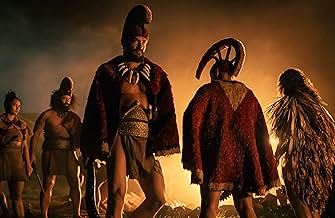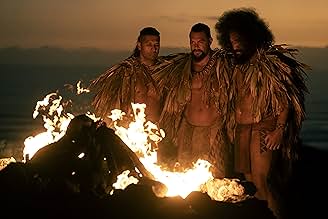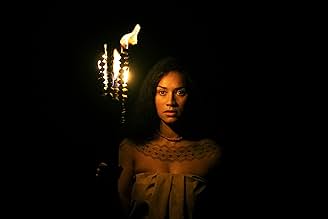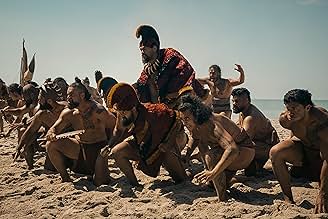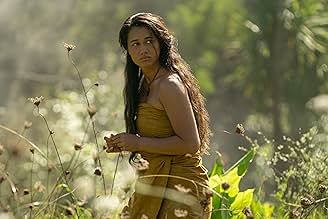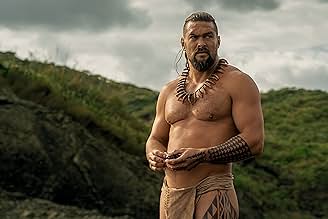Ajouter une intrigue dans votre langueA thrilling, unprecedented telling of the unification of the Hawaiian Islands from an indigenous perspective. A Hawaiian war chief joins a bloody campaign to unite the warring islands in ord... Tout lireA thrilling, unprecedented telling of the unification of the Hawaiian Islands from an indigenous perspective. A Hawaiian war chief joins a bloody campaign to unite the warring islands in order to save them from the threat of colonization.A thrilling, unprecedented telling of the unification of the Hawaiian Islands from an indigenous perspective. A Hawaiian war chief joins a bloody campaign to unite the warring islands in order to save them from the threat of colonization.
Parcourir les épisodes
Avis en vedette
The film starts strong, with an engaging story and a great atmosphere that pulls you in right away. The action sequences are fun, and the overall pacing keeps things enjoyable from start to finish.
That said, Jason Momoa still carries his familiar on-screen persona. While his charisma is undeniable, it sometimes makes it harder for me to fully see the character rather than the actor. It's still a solid and entertaining movie, but for me, that extra layer of immersion was a bit harder to find.
That said, Jason Momoa still carries his familiar on-screen persona. While his charisma is undeniable, it sometimes makes it harder for me to fully see the character rather than the actor. It's still a solid and entertaining movie, but for me, that extra layer of immersion was a bit harder to find.
Even with all the footage of nearly naked men charging through jungles and across beaches to engage in grisly dances of bone breaking and neck slitting with weapons made from shark teeth, Apple TV's "Chief of War" is a work of impressive filmmaking and awesome storytelling.
The visuals of the $350-million production capture the majesty and pay proper respect to Hawaii's landscapes and seascapes (even if much of the filming took place in New Zealand). As of the end of the second episode, most of the characters were still speaking Hawaiian, subtitled on screen. It was one of the many demands for authenticity made by producer and star Jason Momoa.
Whether or not Momoa deserves all the credit, the production is steeped in realism, integrity and soulful understanding of the culture it depicts. Although Captain Cook had arrived and met his fate before the story begins, the islands were still separate kingdoms in the late 1700s, each with its own royalty and ruler. Relations between them were uneasy, never more than one step away from war.
The lush, tropical geography of paradise provides the backdrop for cutthroat warfare. Every Maui resident has heard the tales of when the waters of Iao Stream ran red with blood.
It would fall to the king who proved himself most mighty - ultimately Kamehameha I - to finally unify the chain of islands into a kingdom. The nine-part series leads up to that fateful unification.
The name of Momoa's character, Ka'aina, is not as familiar as others in these early chapters of written island history. But as a revered war chief, Ka'aina would play a key role navigating the treacherous shifting sands of tribal alliances and conflicts. Other names though, namely Ka'ahumanu (scene-stealing Luciane Buchanan), bring the chicken skin of instant recognition to those even slightly familiar with island history.
Moku, played by Maui's Moses Goods, appears in eight of the nine episodes. Maui's film industry veteran Branscome Richmond shows up as King Kalaniopu'u in Episode 3. The cast is almost all indigenous, some making their first appearances on screen.
Having the characters speak Hawaiian is a gutsy call for the folks at Apple. But there are rewards. The cadences of the language are lilting and haunting, accompanying the subtitles. The writers, including Momoa, have a lot of dots to connect for audiences unfamiliar with the history of the realm that would come to be named Hawaii. They have to depend on the characters' dialogue to provide the historic and cultural context of the action. The fact that this feat of storytelling feels like poetry - and echoes with the power and myth of the culture's oral tradition including the creation chant, the Kumukipo- is all the more remarkable.
The visuals are poetry, too. Hawaii's landscapes are filmed in a way showing that humans' place in them is a tiny speck in the natural grandeur. This version of Hawaii feels organic - a way of life in harmony with the land and the sea - rather than a depiction of "natives," seen through a lens by a culture from elsewhere.
The fascinating faces of the characters, some adorned with tattoos, are shot in close-up, providing them with the proper gravitas and honor. Prophesy and myth are given weight equal to other plot elements - as when the milky-eyed spirit Taula (Roimata Fox) appears in visions foretelling future events.
"Chief of War's" vicious violence is almost unbearable to watch at times, but its results were no more lethal than all the blood baths and genocides carried out by more supposedly "civilized" societies through the centuries.
The first Polynesian voyagers to arrive on Hawaii's shores arrived a millennium before Captain Cook "discovered" the islands. The voyages navigated by the stars in open canoes across thousands of miles of open ocean a thousand years before the Europeans realized that the Earth wasn't flat.
Still, the more deeply the show dives into the unique history and culture of these particular Pacific Islands, the more it discovers what it means to be human, anywhere on the planet.
"Chief of War's" roots are ancient, translated into cutting-edge film technology, Rather than mere narrative, it is an origin story both natural and supernatural, searching for the truths of the people and culture of a place often mistaken for paradise.
The visuals of the $350-million production capture the majesty and pay proper respect to Hawaii's landscapes and seascapes (even if much of the filming took place in New Zealand). As of the end of the second episode, most of the characters were still speaking Hawaiian, subtitled on screen. It was one of the many demands for authenticity made by producer and star Jason Momoa.
Whether or not Momoa deserves all the credit, the production is steeped in realism, integrity and soulful understanding of the culture it depicts. Although Captain Cook had arrived and met his fate before the story begins, the islands were still separate kingdoms in the late 1700s, each with its own royalty and ruler. Relations between them were uneasy, never more than one step away from war.
The lush, tropical geography of paradise provides the backdrop for cutthroat warfare. Every Maui resident has heard the tales of when the waters of Iao Stream ran red with blood.
It would fall to the king who proved himself most mighty - ultimately Kamehameha I - to finally unify the chain of islands into a kingdom. The nine-part series leads up to that fateful unification.
The name of Momoa's character, Ka'aina, is not as familiar as others in these early chapters of written island history. But as a revered war chief, Ka'aina would play a key role navigating the treacherous shifting sands of tribal alliances and conflicts. Other names though, namely Ka'ahumanu (scene-stealing Luciane Buchanan), bring the chicken skin of instant recognition to those even slightly familiar with island history.
Moku, played by Maui's Moses Goods, appears in eight of the nine episodes. Maui's film industry veteran Branscome Richmond shows up as King Kalaniopu'u in Episode 3. The cast is almost all indigenous, some making their first appearances on screen.
Having the characters speak Hawaiian is a gutsy call for the folks at Apple. But there are rewards. The cadences of the language are lilting and haunting, accompanying the subtitles. The writers, including Momoa, have a lot of dots to connect for audiences unfamiliar with the history of the realm that would come to be named Hawaii. They have to depend on the characters' dialogue to provide the historic and cultural context of the action. The fact that this feat of storytelling feels like poetry - and echoes with the power and myth of the culture's oral tradition including the creation chant, the Kumukipo- is all the more remarkable.
The visuals are poetry, too. Hawaii's landscapes are filmed in a way showing that humans' place in them is a tiny speck in the natural grandeur. This version of Hawaii feels organic - a way of life in harmony with the land and the sea - rather than a depiction of "natives," seen through a lens by a culture from elsewhere.
The fascinating faces of the characters, some adorned with tattoos, are shot in close-up, providing them with the proper gravitas and honor. Prophesy and myth are given weight equal to other plot elements - as when the milky-eyed spirit Taula (Roimata Fox) appears in visions foretelling future events.
"Chief of War's" vicious violence is almost unbearable to watch at times, but its results were no more lethal than all the blood baths and genocides carried out by more supposedly "civilized" societies through the centuries.
The first Polynesian voyagers to arrive on Hawaii's shores arrived a millennium before Captain Cook "discovered" the islands. The voyages navigated by the stars in open canoes across thousands of miles of open ocean a thousand years before the Europeans realized that the Earth wasn't flat.
Still, the more deeply the show dives into the unique history and culture of these particular Pacific Islands, the more it discovers what it means to be human, anywhere on the planet.
"Chief of War's" roots are ancient, translated into cutting-edge film technology, Rather than mere narrative, it is an origin story both natural and supernatural, searching for the truths of the people and culture of a place often mistaken for paradise.
I am deaf and I was born and raised in Hawai'i, but with no Hawaiian ancestry. I still have my highest respect in Hawaiian values and culture. When I heard about this TV series by Jason Momoa, I was thrilled to watch. But once I started watching, I was looking around to turn on the subtitles because I am deaf. To my astonishment, I discovered the Hawaiian subtitles!! Luckily, I took the elementary Hawaiian classes at Kapi'olani CC, and to satisfy my curiosity, I turned on the subtitles in Hawaiian and... it gave me goosebumps!! By seeing the subtitles in true Hawaiian language, I was able to read and understood some of them. Incredible!!! I'm excited to be able to watch this with subtitle options being shown in English and Hawaiian. Mahalo, Jason Momoa and the entire crew behind this TV series and Apple TV for this amazing feat!
Jason Momoa is back with a new series called Chief of War and it's some of the best work he's done in his entire career. It's about four kingdoms in Hawaii that are divided by a war. To prevent more killing and bloodshed, a Hawaiian war chief (Momoa) goes on a mission to unite his people against a new threat that's coming to their land. What follows is an incredible true story and one of the best new shows of the year. It currently has a 94% on Rotten Tomatoes so the reviews have been great. Chief of War reminds me of the Hawaiian version of Shogun. Momoa is the standout here but the entire cast is incredible. I can see this show not only being nominated for a ton of awards but winning them too.
Chief of War is finally here and it has not disappointed. I've been waiting and looking forward to this ever since I first heard about it. Then I saw the trailers and my excitement grew even more. I love these types of shows and movies and I'm a big fan of Jason Momoa. He's had a lot of memorable parts in his career and this is among his best yet. It's such an original story of Hawaiian history that's never been told before. You can tell Momoa but a lot of love into this project. There isn't a dull or boring scene in the entire series. The only bad thing is all the episodes aren't released at the same time because this would be best watched as a binge. Apple TV has hit home run after home run. It reminds me of peak HBO when almost every show they put out is a must watch. I can't recommend this show enough.
Le saviez-vous
- AnecdotesJason Momoa and Temuera Morrison play Hawaiian chieftains Ka'iana and Kahekili. They were previously son and father in the "Aquaman" film duology.
- ConnexionsReferenced in The Nite-Cap: Has The Superhero Hype Come To An End? (2025)
Meilleurs choix
Connectez-vous pour évaluer et surveiller les recommandations personnalisées
August 2025 TV and Streaming Premiere Dates
August 2025 TV and Streaming Premiere Dates
Night Always Comes and "Outlander: Blood of My Blood" are two of this month's most anticipated TV releases. Check out our August calendar for more!
- How many episodes does Chief of War have?Propulsé par Alexa
Détails
- Durée
- 50m
- Couleur
- Mixage
- Rapport de forme
- 2.39:1
Contribuer à cette page
Suggérer une modification ou ajouter du contenu manquant







